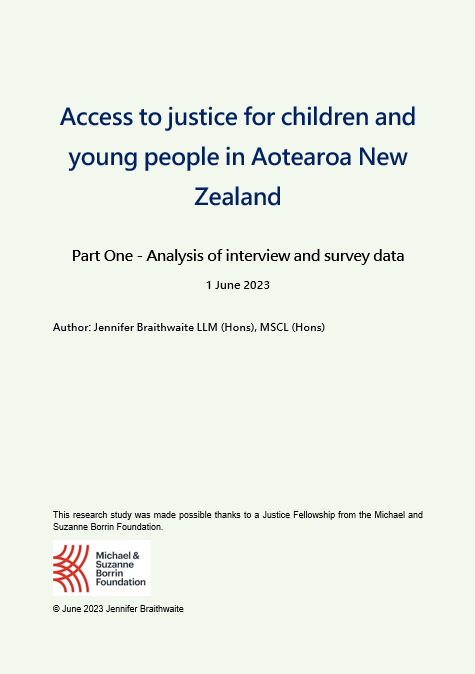Reports and Working Papers
Part One - Analysis of interview and focus group data
This report contains analysis of data from semi-structured interviews with adults with expertise in the justice system and/or working with particular groups of children and young people, and from a survey of children and young people aged 14 to 24.
Part Two - Justice problems and barriers for all children and young people
This report discusses the meaning of access to justice and other related concepts such as legal empowerment as well as the specific meaning of access to justice for children and child-friendly justice. It then discusses the justice problems experienced by children and young people generally, as well as common barriers to accessing justice. The analysis in this report is based on my review of the research and literature in New Zealand and overseas as well as analysis of information obtained from the government and Crown entities. Click here to download.
This report is supported by a series of ten working papers discussing the justice problems and barriers to accessing justice experienced by particular groups of children and young people identified as likely to experience differing justice problems or barriers to access. The working papers also discuss some of the possible solutions for addressing the justice gap for each specific group and are available below:
1. Children and young people in care or with care experience
2. Disabled and neurodiverse children and young people
3. Tamariki and rangatahi Māori
4. Pacific children and young people
5. Rainbow and takatāpui children and young people
8. Children and young people in poverty or socio-economic disadvantage
Part three: Closing the justice gap
Part Three explores possible solutions or ways to close the justice gap for children and young people in Aotearoa New Zealand. This part of the study is also supported by a series of working papers in relation to possible solutions. At the time of writing these working papers consider the following topics with additional working papers likely to follow:
12. Legal service delivery, non-lawyer services, and integrated services
13. Data, evidence and measuring change
15. Training for professionals
16. Legal education and continuing professional development for lawyers and judges

